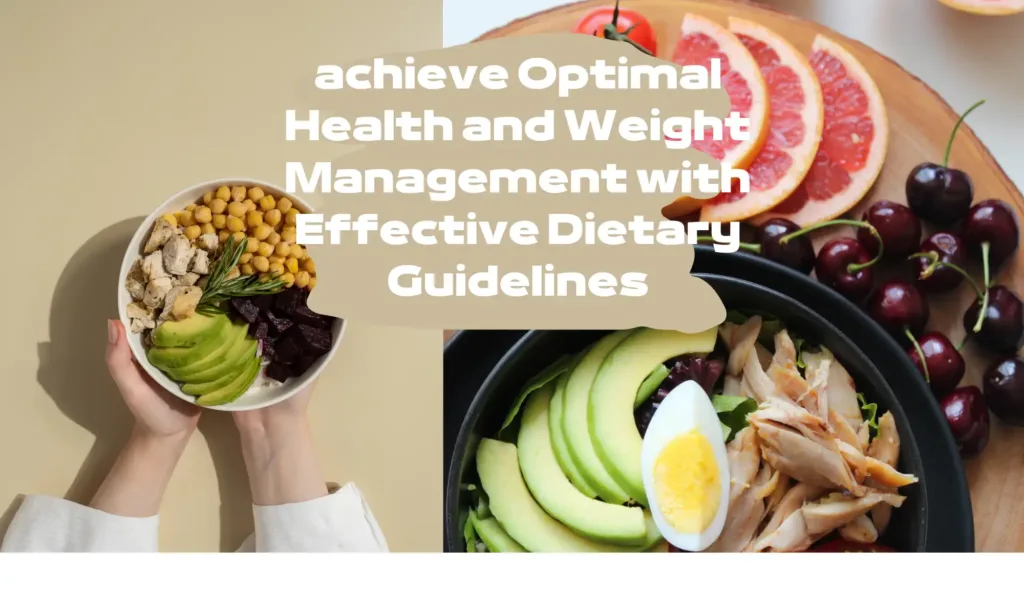In today’s fast-paced world, maintaining good health and managing weight can be a challenging task. However, with the right guidance and adherence to effective dietary guidelines, you can achieve optimal health, prevent diseases, and attain your weight management goals. This article presents the most up-to-date scientific advice on food selection, providing you with valuable insights to improve your overall well-being. Whether you’re a health-conscious individual or someone with special nutritional requirements, these general guidelines will steer you towards a healthier and more fulfilling life.
Subheading 1: Aim for Fitness
Working Towards a Healthy Weight and Embracing Physical Activity
Maintaining a healthy weight is crucial for overall well-being. By incorporating physical activity into your daily routine, you can enhance your fitness levels while enjoying life to the fullest. Aim to engage in moderate to vigorous physical activity for at least 30 minutes a day, five days a week, to keep your body active and energized. Remember, healthy eating plays a vital role in sustaining the energy you need for physical exertion. To manage stress effectively, consider incorporating exercise, healthy eating, relaxation techniques, and adopting good coping skills into your lifestyle.
Subheading 2: Build Healthy Eating Habits
Enhancing Your Nutritional Intake through Smart Food Choices
To promote a well-rounded diet and achieve optimal health, it is essential to include a variety of nutrient-rich foods in your meals. Pay particular attention to the following:
- Increase Vegetable Consumption: Incorporate three or more servings of vegetables into your daily diet, with a focus on dark green, red, and orange vegetables. These vibrant options offer a wealth of essential vitamins and minerals.
- Embrace Fruits: Enjoy the natural goodness of fruits by consuming two or more servings each day. Fruits provide essential nutrients and contribute to your overall well-being.
- Opt for Whole Grains: Choose whole-grain, high-fiber breads and cereals as part of your diet, consuming three to six servings per day. Reduce or eliminate refined or processed carbohydrates, ensuring that the majority of your grain intake comes from whole grains.
- Choose Low-Fat Dairy: Opt for fat-free or low-fat milk and dairy products, which offer essential nutrients while minimizing unnecessary fat consumption.
- Include Lean Protein Sources: Diversify your protein intake by incorporating eggs, beans, poultry without skin, seafood, lean meats, unsalted nuts, seeds, and soy products into your diet. If you consume meat, prioritize white meat over red meat, aiming for at least four times more consumption of white meat.
- Limit Saturated Fats and Trans-Fats: Reduce your intake of saturated fats and trans-fats, such as those found in partially hydrogenated oils, as much as possible. Instead, opt for healthier alternatives like vegetable oils, such as olive or canola oil.
- Moderate Sodium Intake: Decrease your daily salt or sodium intake, aiming for less than 1,500 mg if you are above 50 years old or have conditions like hypertension, diabetes, or chronic kidney disease.
- Avoid Unhealthy Foods: Restrict or eliminate “junk food” from your diet, which includes foods containing refined white flour, solid fats, trans fats, added sugars, and excessive sodium.
- Say No to Sugary Drinks: Minimize or eliminate consumption of sodas and other sugar-added beverages, as they are high in empty calories and offer little to no nutritional value.
- Moderate Alcohol Consumption: If you choose to consume alcoholic beverages, do so in moderation and ensure it does not pose any risk to your health or the well-being of others.
Subheading 3: Effective Strategies for Weight Loss
Losing Weight Sustainably with Smart Choices and Active Living
If your goal is weight loss, following these strategies can help you achieve success while ensuring a balanced approach to your overall well-being:
- Caloric Reduction: Decrease your daily calorie intake by opting for smaller portion sizes. Avoid “upsizing” meals at fast food establishments, and instead focus on portion control.
- Adhere to Dietary Guidelines: Incorporate the aforementioned dietary guidelines into your weight loss plan to ensure a balanced and nourishing approach.
- Eliminate Sugar-Added Drinks: Remove all sugar-added drinks from your diet. You may consume 100% fruit juice, unsweetened, but limit your intake to one or two servings per day. Make water your primary beverage choice.
- Eliminate Sugar-Added Drinks: Remove all sugar-added drinks from your diet. You may consume 100% fruit juice, unsweetened, but limit your intake to one or two servings per day. Make water your primary beverage choice.
- Reduce Sedentary Activities: Minimize the time spent on sedentary activities, especially excessive television viewing. Utilize your screen-free time to engage in productive hobbies, house cleaning, yard work, or fun activities that promote movement.
- Regular Physical Activity: Engage in moderate physical activity, such as walking, cycling, swimming, or using aerobic exercise machines, for 30 to 60 minutes a day, at least five days a week. This will contribute significantly to your weight loss journey.
- Strength and Toning Exercises: Perform muscle strengthening and toning exercises at least 2 or 3 days a week. These activities help build lean muscle mass and improve overall body composition.
Conclusion: Embrace a Healthy Lifestyle for Long-Term Well-being
By following these evidence-based dietary guidelines, you can embark on a journey towards optimal health, disease prevention, and effective weight management. Remember, these guidelines cater to the general population, and if you have specific nutritional needs or chronic conditions, it is advisable to seek personalized recommendations from a registered dietitian. Embrace a balanced lifestyle, incorporating healthy food choices, regular physical activity, and effective stress management techniques to unlock your full potential and live a vibrant, fulfilling life.

